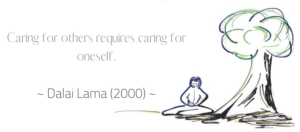
In four short weeks we will arrive at year’s end. Most of us will be glad to put 2020, and all that it brought with it, behind us. The prospects for 2021 look promising. A vaccine that will begin to control a virus that has controlled us; a new President who, at this juncture, seems intent on uniting our nation, and the opportunity to once again shake hands, hug, and socialize with family and friends. At the same time, the challenges associated with the past year served to bring out the best in us. The dedication and commitment of first responders inspired us, while the thoughtfulness of a stranger could bring us to tears. Perhaps 2020 will best be remembered as a year of compassion, as a year when we thought of others, and let our thoughts guide our actions.
Compassion is a powerful word and an even more powerful character trait. When you are compassionate you feel the pain (i.e empathy) or recognize the person is in pain (i.e sympathy) and then do your best to alleviate the person’s suffering. It can be as simple as Giving $10 or a box of energy bars to the homeless veteran who stands at the intersection each morning, or something as multi-layered as coordinating a Veterans’ relief organization. But here’s the challenge, sometimes we spend so much energy directing our compassion to address the needs of others, that we forget to direct it inward and care for ourselves; caring for the caretaker if you will.
Dr. Kristen Neff is Co-Founder for the Center for Mindful Compassion. She is an Associate Professor of Educational Psychology at the University of Texas and a pioneer in the field of self-compassion research. She defines Self-compassion as compassion directed inward, relating to oneself as the object of care and concern when faced with the experience of suffering. Simply put, it’s about being kinder to ourselves.
Why self-compassion and why now? A better question would be, Why not? Research by Neff and others shows the practice of self-compassion:
- Increases levels of emotional intelligence, resilience, integrity, and makes you more compassionate toward others.
- Provides support as you navigate setbacks, regain clarity, and move forward productively.
- Enhances a growth mindset that seeks challenge.
- Fosters integrity, thus enabling leaders to act responsibly and morally, even when undertaking difficult decisions.
Ultimately, having self-compassion builds resiliency while increasing life satisfaction, optimism, social connectedness and happiness.
So how do we start? First, we must understand the key elements of self-compassion, as identified by Neff, and then practice them a little every day. The simplest way is to try treating yourself as you would treat a friend who is struggling. Sometimes this isn’t so easy, especially after a lifetime of criticality and self-judgment.
- Mindfulness: Learning to pay attention to our moment-to-moment experiences without judging them. We can’t be kind to ourselves unless we first acknowledge we are in pain. In tough times, mindfulness helps us pause, breathe, and see our suffering clearly.
- Kindness: Self-compassion adds the gentle touch of care when we are in pain. When things go wrong, we often try to suppress the pain, berate ourselves, or leap into problem-solving mode. Imagine how you might support a friend who is suffering. Would you tell your friend to forget about it? Would you call your friend an “idiot”? Would you instantly try to fix the problem? Or would you offer your friend kindness, and let them know you care.
- Common Humanity: The final step is to recognize our common humanity, which reminds us that we are not alone in our suffering. Common humanity helps us remember that other people also get divorced or have sick children or get a flat tire. Our belief that this is “my” personal problem and that we are the “only one” suffering isolates and separates us. Self-compassion helps us reframe our situation in light of our shared human experience.
Dr. Shauna Shapiro is a professor, author, and internationally recognized expert in mindfulness and compassion. She offers the following morning exercise as a self-compassion starter:
- Begin by sitting quietly and asking yourself: What pain or difficulty needs my attention? Listen to whatever arises. Stay with your direct experience. Label any emotions that arise: “sadness, fear, frustration.” Stay open and nonjudgmental (Mindfulness)
- Imagine what you might say to a friend facing a similar challenge as you. How might you care for your friend? What might you say? How might you support and encourage? (Kindness)
- Finally, remind yourself how natural it is for all of us to experience hard times. Reflect on all the other people in the world who might be in a similar situation right now. Offer compassion to yourself and all the people who are also struggling. (Common humanity)
As we face a world that’s more uncertain than ever, we need leaders who connect and uplift others, and this starts by exercising kindness towards yourself. Self-compassion is not a quick fix—it takes strength, courage, and faith. The key is to rest in the comfort of this universal truth: You can be your own best friend, treat yourself as if you are!
Embrace the Challenge
